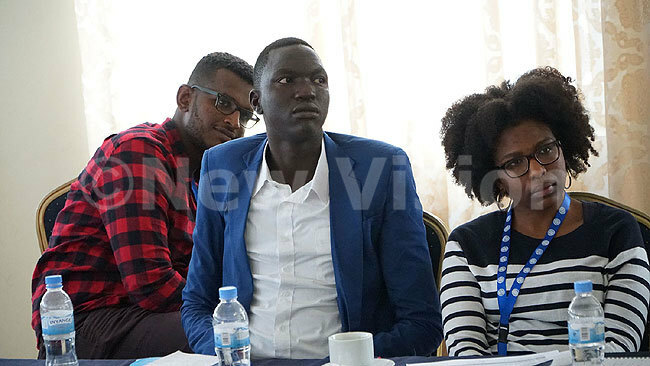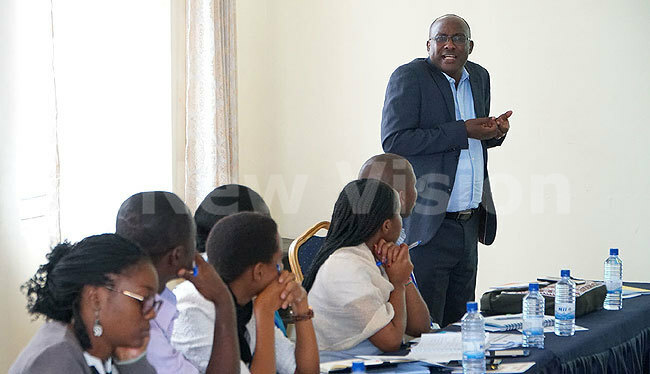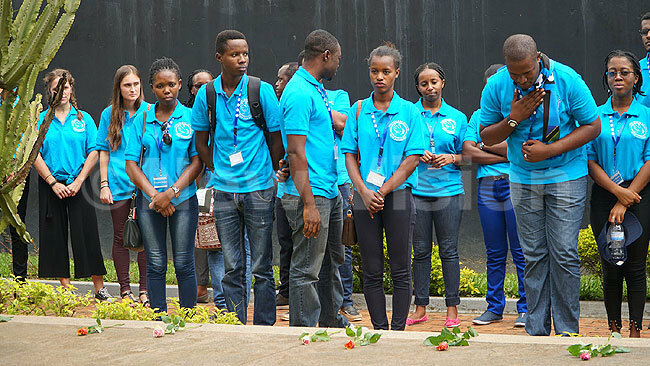Kigali conference: African youth urged to be critical thinkers
The conference in the Rwandan capital Kigali is now in its 16th edition.
PIC: Ugandan participants Ronah Amanyabyona and Silas Baryagasha looking at the wall of fame at Kigali genocide memorial that has a list of genocide victims. (Credit: Steven Odeke)
PEACE BUILDING
KIGALI - Youths across Africa have been urged to be critical thinkers and avoid being manipulated by wrong people if they want to be great future leaders in their communities.
This was during the on-going Peace Building programme at the Great Seasons Hotel in the Rwandan capital Kigali.
The conference is now in its 16th edition and is organised by Kigali-based peace building and social justice organisation, Never Again Rwanda (NAR).
It seeks out youthful participants, especially university students and young professionals across the Great Lakes region and other African countries to teach them ways of promoting sustainable peace, prevent genocide and promote social justice in their respective communities.

From left, Shawgi Omer Nawai Ahmed (Sudan), Lokii Lokwaar Eliah (South Sudan) and Sawsan Musa Adam Abdul-jalil (Sudan) attending a session. (Credit: Steven Odeke)
Right from the start of the conference Monday this week, facilitators addressing the over 30 youthful participants have been making reference to Rwanda's dark past (1994 genocide), the Cambodian 1975 genocide and the German-Armenian genocide.
They have cited the infamous events as case studies of bloodbaths that involved so many youths who had been brainwashed and misled by wrong people to commit the atrocities that could have been avoided or prevented.
Participants at the conference are from Uganda, Rwanda, Kenya, Tanzania, Nigeria, Cameroon, Democratic Republic Of Congo, Burundi, Sudan, South Sudan, Zimbabwe and Rwanda.

Over 30 youths are taking part in the conference in Kigali. (Credit: Steven Odeke)
Ronah Amanyabyona, 21, is a Ugandan participant at the event.
A volunteer at Youth Aid Africa with focus on peace-building in Kampala, she says she has learnt a lot about peace and life during the conference.
"I have learnt a lot about being peaceful at heart and relating with everyone regardless of their cultures. I believe lessons from this conference will help me be an able leader in communities back home," Amanyabyona says.
Evelyn Kenyana, a youth development officer at Rwenzori Information Centers Network, is also participating.
"For a person who comes from an area that is recovering from conflicts in Kasese, I am being taught in this conference about reconciliation and transitional justice. Reconciliation is about forgiveness and I intend to impart that to the youth I work with and handle in post-conflict areas back home in Kasese district," says the 25-year-old.

Participants from different African countries paying their respects to the victims of the Rwandan genocide. (Credit: Steven Odeke)
One of the faciliators is Johnson Mugaga, division manager in charge of all programmes at the National Unity and Reconciliation Commission (NURC).
He led the participants through the causes and stages of genocide in Rwanda.
Mugaga says the manipulation of political crises and economic turndown by leaders to scapegoat a vulnerable group, usually the minority, as is the case in Rwanda, is what leads to so many conflicts.
"There are always excuses that stimulate wars that the youth today must detect and avoid. The Nazis blamed the jews for the loss of World War I and the economic crisis of 1929 and the Rwandan government accused the Tutsi in Rwanda for being part of the invading RPF forces in 1990. We all know what happened thereafter.
The two-week conference ends on March 9.